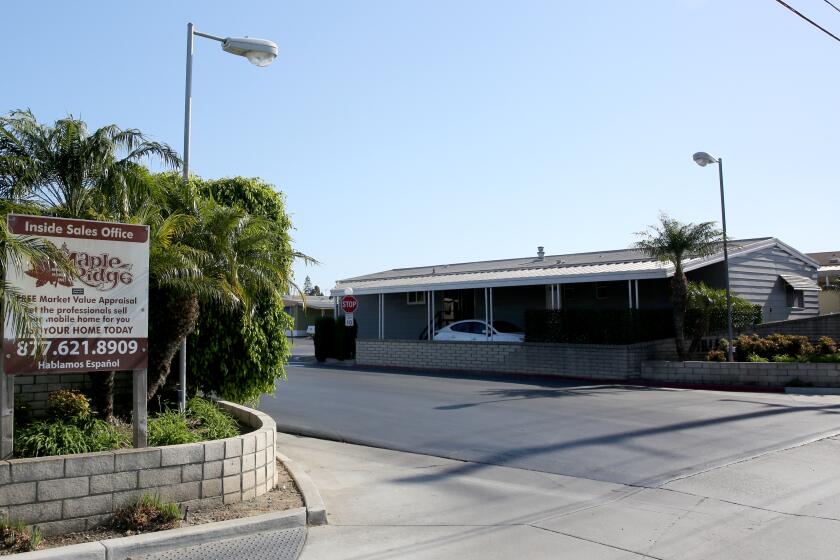THROUGH MY EYES -- RON DAVIS
- Share via
Huntington Beach’s proposed sports complex is just that -- complex.
Currently, the estimated cost has jumped to some $17 million. But, to
be fair to the proponents, it is seldom fair to merely look at the costs
without looking at how they will be repaid.
Frankly, I couldn’t care less if the costs of the complex were $100
million, so long as the taxpayers weren’t paying for it. On the other
hand, if the anticipated costs were a mere $2 million or $3 million, I
o7 would f7 care if the source of the funding was the taxpayer.
Not because I want to deprive people of open space (which would exist
with or without the complex) or because I believe people don’t deserve
improved recreational fields, but because I think repairing sewers,
streets, sidewalks and block walls, and other aspects of our
infrastructure, are more important.
Call me misdirected, but I think if I have to make a choice, I’m
probably better off having great brakes and tires on my car than a
leather interior and state-of-the-art stereo system. To suggest that we
can have both ignores the condition of our wallets called the general
fund.
There is a suggestion by the city staff and the proponents of the
complex that the complex will pay for itself -- that it will sustain
itself from non-tax revenue sources. This conclusion is based on certain
financial assumptions and projections.
Another phrase for “assumptions” and “projections” is “educated
guess.” And, I don’t want guesses, I want guarantees.
We only have to look back two months to see how optimistic promises
and representations, even assuming they were made in good faith,
disappear like the sewage in a Downtown sewer line. Remember Wards coming
to the podium and assuring the City Council its was prepared to make a
substantial financial commitment to renovate its store and was prepared
to cooperate with the intended Crossings at Huntington Italian village
theme?
Things happen, and in this case, it is called a bankruptcy, leaving a
hollow store in the city filled with hollow promises, assumptions and
projections.
If the city’s projections and assumptions regarding the sports complex
are flawed, and I believe they are, we, the taxpayers will be left
holding that thing at first, second and third base, called the bag. We,
the taxpayers, are the payment guarantors. If the deal doesn’t work the
way the proponents expect it to, guess who gets stranded between first
and second?
The $800-million price tag for essential repairs to the infrastructure
isn’t going to get smaller, and the infrastructure won’t heal itself. For
that reason, I support covering our bases rather than constructing them.
The projections offered by the city include the anticipated, and I
emphasize the word anticipated, sales tax revenue from both Wal-Mart and
Lowes.
Presumably, this is based on last year’s advisory vote by the citizens
indicating that if Wal-Mart was permitted to build, the citizenry
supported use of the tax revenue for playgrounds, parks and sports
fields. But, in my mind, we were asked the wrong question.
If I asked you if you wanted a new BMW or Cadillac placed in your
driveway every six months, you’d probably say yes. But, if I also told
you that to do so you’d be charged $75,000 a year for the privilege, your
answer might be a little different.
What you should have been asked is whether you wanted the sales tax
revenue to go to playgrounds, parks and sports fields, with the
understanding that you would then have to tax yourself for the full cost
of infrastructure repairs.
I happen to believe that given a choice, you would have thought that
sports fields were less of a priority than repairing sewers, streets and
sidewalks.
I believe that you might have wanted to spend whatever tax revenue
Wal-Mart and Lowes generated to repair the infrastructure so that if you
decided to tax yourself to repair it, at least the burden would be less.
According to the city’s financial projections, the sports complex gets
thrown out at second without the sales tax revenues from Wal-Mart and
Lowes.
So, in effect, the taxpayer will be subsidizing the complex. This
issue should be stretched out on a couch and carefully analyzed to
determine whether I have a complex, or the city should have one.* RON
DAVIS is a private attorney who lives in Huntington Beach. He can be
reached by e-mail at o7 [email protected]
All the latest on Orange County from Orange County.
Get our free TimesOC newsletter.
You may occasionally receive promotional content from the Daily Pilot.



